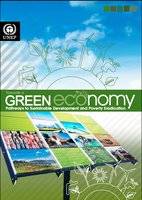Green Economy Report (UNEP)
United Nations Environment Programme / 2011
 This landmark report published by the UNEP in 2011 went a long way to putting the concept of the green economy on the international agenda ahead of the Rio+20 conference in 2012.
This landmark report published by the UNEP in 2011 went a long way to putting the concept of the green economy on the international agenda ahead of the Rio+20 conference in 2012.
Read report
The Green Economy Report argues the reason why there are so many global crises associated with climate change, food, energy and finance is because money was being invested in a “brown economy” (e.g. fossil fuels) instead of green sectors (e.g. renewable energy). This is what UNEP calls an era of capital misallocation.
The report claims that there would be just as much growth and more so in the long-term if there is a shift to a green economy now. This requires spending US$1.3 trillion a year (around 2% of global GDP) from now until 2050. This will provide green jobs in areas like recycling and reduce poverty. It calls for the elimination of fossil fuel subsidies , green taxes and energy efficiency. UNEP says it is a myth to think there is a trade-off between economic progress and environmental sustainability.
A key objective is to include externalities in decision-making by investing in natural capital that is so important to the livelihoods of the poor.
Where would all the funding needed come for all this? UNEP says public money should be used to encourage the private sector (who will provide the biggest chunk) to re-allocate investments. Other sources will be innovative mechanisms like REDD+ (Reducing Emissions from Deforestation and Forest Degradation).
Read report
Selected quotes from the report
The Green Economy Report is compiled by UNEP’s Green Economy Initiative in collaboration with economists and experts worldwide. It demonstrates that the greening of economies is not generally a drag on growth but rather a new engine of growth; that it is a net generator of decent jobs, and that it is also a vital strategy for the elimination of persistent poverty. The report also seeks to motivate policy makers to create the enabling conditions for increased investments in a transition to a green economy.
UNEP’s definition of a green economy was influential in the build up to Rio+20 and is still a major reference point for anyone working on the green economy.
A green economy as one that results in improved human well-being and social equity, while significantly reducing environmental risks and ecological scarcities. In its simplest expression, a green economy can be thought of as one which is low carbon, resource efficient and socially inclusive.
Read a summary of the The Economics of Ecosystems and Biodiversity (TEEB) synthesis report
Achim Steiner (UNEP) argues for a change in economic paradigm towards a green economy
————————————
This summary was prepared by Why Green Economy?. The views expressed have been paraphrased. See the original source for more information.

Leave a Reply